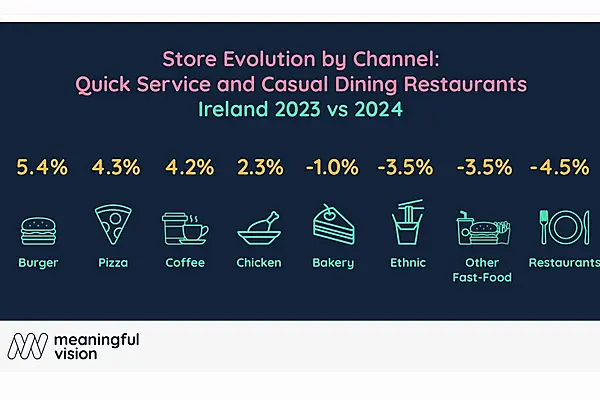Hospitality Ireland presents a round-up of global airline, aviation and travel news.
U.S. FAA refers 37 unruly airline passengers to FBI for criminal review
The Federal Aviation Administration (FAA) said Thursday November 4 that it has referred more than three dozen unruly passengers to the FBI for potential criminal prosecution amid a sharp rise in onboard incidents this year.
The FAA and Justice Department said they had established an information-sharing protocol for the FAA to refer unruly passenger cases to the FBI for review.
The Justice Department and FBI "are committed to prioritizing the review of the cases referred by the FAA and initiating criminal prosecution where appropriate," the agencies said.
U.S. airlines have reported a record number of disruptive and sometimes violent incidents this year, and the FAA has pledged a "zero tolerance" approach. The FAA and Justice Department said the "increased coordination is part of a broader effort to prevent dangerous unruly passenger incidents."
An FAA spokesman said the agency has initiated 227 enforcement cases and referred 37 to the FBI for review.
“Let this serve both as a warning and a deterrent: If you disrupt a flight, you risk not just fines from the FAA but federal criminal prosecution as well,” said FAA Administrator Steve Dickson.
On Oct. 8, President Joe Biden said he instructed the Justice Department to "deal" with the rising number of violent incidents onboard planes.
FBI Acting Assistant Director Jay Greenberg said the agency is "working in tandem with our partners to ensure the safety of all passengers and investigate crimes within our jurisdiction aboard commercial flights."
Through Nov. 1, there have been 5,033 reports of unruly passenger incidents, including 3,642 related to pandemic face covering regulations.
In June, a group representing major U.S. airlines, such as American Airlines, Delta Air Lines and United Airlines, as well as aviation unions, asked the Justice Department to prosecute violent air passengers.
FAA and Justice Department officials began meeting in August "to develop an efficient method for referring the most serious unruly-passenger cases for potential criminal prosecution," the agencies said, adding that "resulted in a process where the FAA regularly sends cases to the FBI, which forwards those that merit potential prosecution to field offices for further investigation."
On Monday https://www.reuters.com/world/us/us-charges-passenger-with-assaulting-american-airlines-flight-attendant-2021-11-01, U.S. prosecutors in Colorado charged a 20-year-old California man with assaulting a flight attendant on an Oct. 27 American Airlines flight bound for Santa Ana, California, that forced the plane to land.
Witnesses and court records said a flight attendant was punched in the nose, resulting in bleeding and a concussion. American Airlines Chief Executive Doug Parker called it "one of the worst displays of unruly behavior we’ve ever witnessed."
Air Canada CEO Apologises To Quebecers, Pledges "To Improve My French"
Air Canada chief executive officer Michael Rousseau on Thursday November 4 apologised for remarks suggesting he did not need to speak French, Canada's second language, even though the airline is officially bilingual.
"In no way did I mean to show disrespect for Quebecers and francophones across the country. I apologize to those who were offended by my remarks," Rousseau said in a statement. "I pledge today to improve my French".
Rousseau was backtracking from remarks to reporters in Montreal on Wednesday that triggered widespread criticism in the predominantly French-speaking province of Quebec, where the airline is headquartered.
Rousseau, who took over in February, stumbled after being grilled over his inability to speak French properly despite having lived in Montreal for 14 years.
The comment that drew criticism was: "I've been able to live in Montreal without speaking French, and I think that's a testament to the city of Montreal". He also blamed his busy schedule.
The issue is sensitive in Quebec, the second most populous province, where unhappiness over the dominance of English helped the rise of the separatist Parti Quebecois (PQ) in the 1970s. Quebec has had several PQ governments.
Canada also has a federal separatist party, the Bloc Quebecois, which is a potential partner for Prime Minister Justin Trudeau's minority Liberal administration. Trudeau needs the support of opposition parliamentarians to govern.
"We ask the federal government to use its position as an Air Canada shareholder to demand Mr. Rousseau's resignation," the Bloc said in a statement.
In April Ottawa took a stake in Air Canada, which is subject to the Official Languages Act and must serve customers in English and French.
Provincial Justice Minister Simon Jolin-Barrette, who is pushing draft legislation to strengthen the use of French, condemned Rousseau's comments as unworthy.
"The big boss of Air Canada expresses everything we rejected decades ago: contempt for our language and our culture," he tweeted.
Federal Official Languages Minister Ginette Petitpas Taylor said Air Canada's leaders had to set a good example.
Air Canada this week reported a better-than-expected quarterly revenue.
"Bear of the Pyrenees", Former Airbus CEO Jean Pierson Dies
Jean Pierson, the "Bear of the Pyrenees" who propelled planemaker Airbus onto the global stage and began its transformation from a loose consortium into a European giant, has died, former colleagues said on Thursday.
Pierson died on Wednesday November 3 aged 80 in France, they said.
The Frenchman was Airbus' longest-serving chief executive, between 1985 and 1998, and was credited with breaking into Boeing's home market in the United States, kickstarting one of the world's greatest business rivalries.
"He was a great personality and leader. He brought Airbus from a startup to compete head-to-head with Boeing," said former spokeswoman Barbara Kracht, whose father co-founded Airbus.
A burly and voracious dealmaker who grew up outside the narrow Parisian-educated circle that dominated French industry, Pierson strode factory floors and exhorted sales teams to take on Boeing on its home turf despite executives' initial wariness.
In 1997, he landed a breakthrough order for 400 jets from U.S. Airways for which he dropped his trousers in protest against a last-minute discount demand, a tactic first recounted in a 2007 book "Boeing vs Airbus", which he later confirmed.
On another occasion, Pierson told Reuters, he ripped off his shirt, telling a tenacious airline boss that the garment might as well be thrown into the aggressively priced deal.
"He was an inspirational leader. He didn't care about his salary and all he cared about was the people and the success of Airbus," said Mohamed El Borai, president of Reliance Aerospace and a former Pierson employee.
Nicknamed the "Bear of the Pyrenees," the gruff steak-loving businessman and bon vivant took gambles that still shape an industry where success or failure is measured in decades.
He strongly backed the A380 superjumbo, which flopped in the market and is about to see its last delivery after just 14 years. But he accurately predicted that the A400M military plane would cause trouble for the then civil manufacturer. It has just won its second export order in 16 years and blown huge losses.
"He knew how to build airplanes and knew that to succeed in a duopoly you can't be a small player," said John Leahy, the uncompromising American promoted over Europeans by Pierson to fill the job of sales chief, which he held for over two decades.
Pierson fought for the future A320 cash cow and threw aides who proposed a different cockpit for the sister A321 out of his office, Leahy said. The one-cockpit strategy set the stage for A321 sales that underpin profits of a new management today.
Pierson was "a great humanist behind the bear facade," said current Chief Commercial Officer Christian Scherer.
Airbus was founded in 1969 as a venture between industrial groups in France, Germany, Spain and Britain and went on to snatch Boeing's crown as the world's largest planemaker.
Crucially, former aides say, Pierson began a long process of integration by declaring the original consortium outdated.
A veteran of shareholder meetings known internally as the "Liar's Club" after the propensity of partners to disguise costs, Pierson campaigned for Airbus to become a single company.
Rather than buying jets from shareholders and selling and supporting them abroad, Airbus would need more control.
After retiring to his fishing boat, Pierson made few appearances as the company plunged into more than a decade of in-fighting under new partners, but he broke silence in 2007 to warn Franco-German power-sharing would fail.
The idea was abandoned in 2013, though the countries remain as shareholders.
American Airlines Delays Vaccine Mandate Until January Next Year
American Airlines Group Inc delayed the rollout of a mandate that requires its U.S.-based employees to be vaccinated against the coronavirus until Jan. 4, Chief Executive Doug Parker said in a letter to employees on Thursday November 4.
This comes hours after the Biden administration moved forward the vaccination deadline for large U.S. companies from Dec. 8 to Jan. 4.
Separately, Southwest Airlines said it was reviewing the revised guidance from the administration.
Biden had in September unveiled plans for the mandate, seeking to increase vaccination rates amid a dangerous surge in COVID-19 cases and get more people back to work.
Qantas Reports Surge In Domestic Bookings As State Borders Open
Qantas Airways Ltd said on Friday November 5 that it had taken nearly 500,000 domestic bookings in the past two weeks as states begin to open their borders, versus around 20,000 in a two-week period in August when parts of the country were locked down.
"Travel demand and confidence levels are high," Qantas Chief Executive Alan Joyce said at the airline's annual meeting.
"Domestically, the crucial Melbourne-Sydney route has started to ramp up," he said. "And most states have outlined their plans to open their borders before Christmas – one of the busiest travel times of the year."
The airline said it would provide a more detailed update to the market next month at a time when international travel is also beginning to return.
Australia eased its international border restrictions https://www.reuters.com/world/asia-pacific/australia-eases-international-border-ban-first-time-since-march-2020-2021-10-31 on Monday for the first time during the pandemic, allowing some of its vaccinated public to travel freely and many families to reunite, sparking emotional embraces at airports.
Qantas last month said all 11,000 of the airline's staff idled without pay, around half its workforce, will return to work by early December as domestic and international flying returns to more normal levels.
Qantas Chairman Richard Goyder said the airline remained on track to choose the preferred suppliers for an order of more than 100 planes to replace its current domestic fleet by the end of the calendar year.
BA-Owner IAG Optimistic On Transatlantic Reopening Despite 2021 Losses
British Airways owner IAG is "very optimistic" about the reopening of transatlantic travel and planning to ramp up capacity on those routes next year, fuelling recovery hopes despite warning of a big loss in 2021.
IAG, which also owns Aer Lingus, Iberia and Vueling, is more dependent on travel between Britain and the United States than its competitors and so has been hit harder by 19 months of North Atlantic travel shutdown during the COVID-19 pandemic.
Chief Executive Luis Gallego said on Friday November 5 that the full reopening of that route on Monday November 8 was "pivotal," and rising capacity would help return the group to profit next year.
"We are very optimistic and I think we are going to have 100% of the capacity that we flew in 2019 next summer," he said, when asked about transatlantic routes.
"When we can operate our flights, we are going to come back soon to a profitable situation."
Shares in IAG opened up 1.8%, before slipping to trade down 2.6%.
"A bullish guide on capacity restoration into 2022 is the most important thing here," Bernstein analyst Alex Irving said.
But for 2021, IAG warned it was heading for a €3 billion loss, hurt by pandemic restrictions for most of the year.
That guidance was slightly behind analysts' consensus forecast for a loss of €2.87 billion, but better than 2020's €4.4 billion loss.
IAG's greater exposure to Britain, where travel restrictions were kept stricter for longer compared to the rest of Europe, and its lower exposure to cargo than peers means it has so far trailed European competitors in its recovery.
Air France-KLM has guided to slightly positive earnings for 2021 and Germany's Lufthansa eked out a small quarterly profit for July-September.
Over the summer, usually the most profitable period for airlines, IAG posted an operating loss before exceptional items of €485 million for July-September, beating analysts' consensus forecast for a loss of €513 million.
Spain's Amadeus Books First Profit Since Start Of Pandemic
Spanish travel booking group Amadeus returned to profit in the third quarter after more than a year of quarterly losses, it said on Friday November 5, citing a pick-up in flight bookings after pandemic-related travel restrictions eased.
The company made adjusted net profit of €23.8 million in the third quarter compared with a €125 million loss in the same period a year ago. Its free cash flow turned positive, with an inflow of approximately €84 million.
However, the net profit was below analysts' average forecast of €38.8 million, according to Refintiv, and Amadeus shares were down 2.7% in early trade on Friday November 5.
Amadeus's slide into the red in the second quarter of 2020 was its first quarterly loss in a decade as the pandemic grounded airliners around the world.
The company, which operates the world's largest travel booking system and offers check-in services and other IT solutions for airports and airlines, is almost fully dependent on international air traffic.
It said it continued to see an uptick in the number of travelling passengers, as air bookings jumped more than four times in the third quarter from the same period a year ago.
The number of reservations made through Amadeus's distribution platforms, however, was still 59% below 2019 levels.
"Looking at the rest of the year, we are confident that our commercial momentum, along with the upward trend in travel volumes, will allow us to maintain this positive progression towards recovery," Chief Executive Luis Maroto said.
Domestic travel is expected to recover to 93% of the pre-pandemic level in 2022, a 20 percentage points improvement from this year, the International Air Transport Association (IATA) said in October.
The industry body expects international travel demand to double next year and reach 44% of the 2019 levels.
Something In The Air: Jet Fuel Demand Ready For Takeoff
Having lagged a recovery in demand to pre-pandemic levels enjoyed by other fuels, jet fuel appears set finally to take off as more governments make air travel easier.
Global jet fuel demand is languishing 15-20% below 2019 levels, according to analysts, but confidence generated by rising vaccination levels has led to increased passenger flight bookings in recent weeks.
"The vaccination rate continues to increase. So, I don't see the reason why aviation demand won't pick up," a Singapore-based jet fuel trader said.
"I think airlines would definitely like to capture the year-end festive travel demand with the blessings from their governments. Logistics, however, can be a challenge, especially setting up VTL (vaccinated travel lane) flights."
Within Europe, air travel has risen in recent months, and as COVID restrictions are relaxed further an increasing number of Europeans are booking flights beyond their continent.
Starting Nov. 8, the United States will admit fully vaccinated foreign air travelers from the 26 so-called Schengen countries in Europe, including France, Germany, Italy, Spain, Switzerland and Greece, as well as Britain, Ireland, China, India, South Africa, Iran and Brazil.
Aside from the United States, other countries that have announced plans to lift extraordinary restrictions on international flights include major tourist destination Thailand, Asian travel hub Singapore, and Israel.
European jet fuel demand is at nearly 72% of pre-COVID levels, having grown for a third consecutive week, when in pre-COVID times it would normally experience a seasonal decline, according to data from Rystad Energy.
Northwest European spot cargo jet fuel prices <JET-C-NWE> have risen by about 30% since mid-August and were trading at $734.50 a tonne on Nov. 4, according to Reuters assessments. Crack spreads <JET-C-NWE, BFO> have more than doubled to around $12.7 a barrel over the same period.
Profit margins for processing jet fuel in Europe rose to a 2021 high of $13.50 a barrel in mid-October. That margin, also known as a crack spread, was trading at about $12 a barrel on Nov. 3, a four-fold increase from the same time period last year - but it is still below where the crack spread was in 2019.
Looking for signals that demand is truly taking off, traders say they were watching how fast airlines fill seats and add additional flights on international routes.
"Right now there's still only one non-stop flight from Houston to London ... we aren't currently planning for a huge spike in jet demand yet," said a senior U.S. refined products trader.
In the United States, consumers are taking more domestic flights, and bookings have increased as the vaccine rollout begins for children aged from 5-11.
At the end of October, consumer spending on U.S. airline carriers exceeded levels reached two years ago for the first time since July, according to Bank of America, which said it could "reflect parents getting more comfortable about traveling during the upcoming holiday season as kids get vaccinated."
U.S. gasoline and diesel demand is at 99% and 93% of 2019 levels, respectively, according to TPH analysts, while jet fuel is at 80%.
"A combination of increasing vaccinations, reduced travel restrictions and pent-up consumer savings should help jet narrow this gap in the coming quarters," said TPH analyst Matthew Blair.
U.S. spot jet fuel prices are currently trading at $2.26 per gallon, up 69% from the same time a year ago. Scheduled global airline seat capacity is 27% below where it was for the same week two years ago and is expected to continue to rise through March, according to aviation data firm OAG. Lufthansa said new bookings are currently at 80% of 2019 levels, prompted by recovering business bookings and rising demand for long-haul flights, especially to the United States, the German airline's most important and profitable market.
Despite the rebound in Europe and re-opening in the United States, a majority of international flights in Asia remain grounded. Several East Asian countries still require even vaccinated international travelers to quarantine at their destinations, limiting trips.
Spot jet fuel prices in Singapore <JET-SIN>, which have gained 21% over the last three months, were at $93.05 per barrel on Wednesday November 3, while the Asian jet fuel crack spreads have risen more than 80% over the same period to almost $13 a barrel.
Tight supplies were also supporting those crack spreads, the Singapore-base trader said.
But, lockdowns have tightened in China, the world's second-largest economy, where authorities have taken a zero-tolerance approach to COVID-19 despite relatively few cases. Beijing authorities have told residents to refrain from leaving the city, postpone weddings, and cut back non-essential gatherings.
Of the flights scheduled on Wednesday November 3 at Beijing Daxing Airport, 60% were cancelled as of the morning, and half of the flights at Beijing Capital International Airport were cancelled.
Vietnam's Vietjet Agrees Deal With Airbus On Plane Delivery Timings
Vietnamese budget airline Vietjet Aviation JSC said it had signed an agreement with Airbus SE on Friday involving the timing of deliveries of 119 planes on order with the European manufacturer.
The airline has 119 A321neo narrowbody planes, used for domestic and regional international flights, on order that have yet to be delivered, according to Airbus' order book. It did not provide details of the new delivery dates in a statement issued on Friday November 5.
Southeast Asian budget carriers that had ordered hundreds of planes before the pandemic have been hit hard by travel restrictions that left fleets largely grounded for months, though the situation is beginning to improve. Vietnam and Malaysia last month allowed domestic flights to resume.
Vietjet's move comes a month after Malaysian budget airline AirAsia Group Bhd also restructured its Airbus orders and revised delivery plans.
Airbus Chief Commercial Officer Christian Scherer said in the statement that the agreement with Vietjet was another example of how the planemaker had worked with customers to find solutions to adapt to the impact of the pandemic.
Vietjet also said it would take delivery of up to three leased A330 widebodies in November as part of the airline's fleet development plan.
Vietnam plans to restart international commercial flights with 15 countries from January next year, its aviation authority said on Friday November 5, eyeing a full resumption by July.
Potential A321neo Freighter May Not Be Part Of AirAsia's Cargo Plan - Logistics Exec
AirAsia Group Bhd's logistics arm Teleport is aiming to expand its fleet of cargo planes but that may not involve tapping into its parent's large order for Airbus SE A321neos, Teleport's chief executive said on Monday November 8.
In an interview with Reuters, Pete Chareonwongsak backed away from comments he made last week that Teleport would look to convert a "meaningful chunk" of AirAsia's orders for 362 A321neo passenger planes to a potential newly built freighter model of the A321neo.
"All I was saying was, if (Teleport is) successful, we're talking about large orders in magnitude of freighters," Chareonwongsak said. "Obviously, AirAsia gives us a huge advantage, but that doesn't automatically mean that we can or we're able to source freighters from AirAsia."
Teleport will look at freighters converted from passenger planes like a Boeing 737-800 it inducted last week as well as newly built freighters to grow its fleet, he said.
Airbus has not announced the development of a freighter model of the A321neo and it faces little or no pressure to win freighter sales to boost the model's production, industry sources said.
Chareonwongsak said Teleport had been involved in AirAsia and Airbus' discussions about the feasibility of a dedicated A321neo freighter model.
He said Teleport aims to scale up its freight business to a size that AirAsia would consider it for operating part of its fleet for freight. Teleport could also source freighters from other airlines or cargo operators, he added.
Upstart Airline Flyr To Raise More Cash After Q3 Loss
Norwegian airline Flyr, which launched its first flight in late June, earned far less revenue than expected in the third quarter and now plans to raise more cash, the carrier said on Monday November 8, triggering a sharp fall in its shares.
The company is one of several upstarts hoping to take a bite out of the Nordic market for air travel, which is dominated by regional airlines SAS and Norwegian Air.
Flyr's revenues amounted to 39.6 million Norwegian crowns ($4.6 million) in the July-September period, with a loss before interest, tax, depreciation and amortisation of 142.8 million, the company said.
"While revenues in August and September were significantly lower than expected due to the general delay in the demand growth that was caused by the Covid-19 Delta variant, there has been a substantial pick up in travel activity since the reopening of society," Flyr said in a statement.
Flyr has secured commitments from new and existing investors for a share sale amounting to 250 million crowns, with board Chairman Erik Braathen among the underwriters, it said.
"The net proceeds from the rights issue will be used to re-establish the company's financial buffer for the period until the company becomes cash-flow positive and for general corporate purposes," it said.
Flyr flew on average between 15 and 16 flights per day in the third quarter, which has since risen to between 20 and 25, it said.
The company's share price fell 12.9% by 0834 GMT to 3.35 crowns on Monday November 8, well below the five crowns paid by investors in the company's initial public offering in March.
Make Your CEO Learn French, Canada Tells Air Canada Board
The chief executive of Canada's largest carrier should have to improve his French as part of his annual board review, the country's No. 2 government official said on Monday November 8 as a language controversy dogged the airline.
Air Canada CEO Michael Rousseau pledged last week to improve his French skills and apologized for remarks suggesting he did not need to speak French, Canada's second language, even though the airline is officially bilingual.
Language remains a sensitive issue in mostly French-speaking Quebec, the country's second-most-populous province, where unhappiness over the dominance of English helped the rise of the separatist Parti Quebecois (PQ) in the 1970s.
Rousseau's comments and decision to give a speech almost entirely in English triggered criticism from Canadian Prime Minister Justin Trudeau and in Montreal, where the airline is headquartered.
Air Canada was not immediately available for comment.
In a letter to Air Canada's board made public on Monday, deputy prime minister Chrystia Freeland said Rousseau's ability to communicate in French "should be incorporated as one of his key performance goals established by the board and play an important part in the board’s evaluation of his annual performance."
Freeland, who is also Canada's finance minister, said the ability to communicate in French should become a criterion for promotion to senior positions at the airline.
As part of a pandemic bailout package, Ottawa in April took a stake in Air Canada, which is subject to the country's Official Languages Act and must serve customers in English and French.
Freeland noted in the letter that Ottawa holds about 6% of Air Canada's outstanding stock, and is one of the carrier's largest shareholders.
"This issue raises questions about the quality of governance exercised by the board of Air Canada with respect to the treatment of the French language within the management ranks of the company," Freeland wrote.
Gulf's Kuwait Airways In Talks With Airbus To Amend 2014 Aircraft Order
Gulf carrier Kuwait Airways is in talks with Airbus to amend a previous order to change the type of aircraft it agreed to buy in a deal announced in 2014, Chairman Ali Aldakhan told a press conference on Tuesday November 9.
Chief Executive Ma'an Razoq later told Reuters that the state-owned airline was now seeking aircraft capable of operating longer, non-stop flights so it could expand in Europe, Africa, Southeast Asia and North America.
"To reach these goals, there must be changes in (the types of aircraft)" Razoqi said, adding the financial cost of the Airbus deal would remain the same.
The airline in 2014 agreed to order 25 aircraft - 10 wide-body A350-900s and 15 narrow-body A320neos. The deal was later expanded in 2018 to 28 jets, Aldakhan said without providing further details, including which jets it was looking to swap.
Airbus declined to comment. Chairman Aldakhan also told the press conference that Kuwait Airways did not take any financial aid from the government during the coronavirus pandemic, and later told Reuters that it is aiming to achieve a balanced budget by the end of 2025.
The airline reported a profit of five million Kuwaiti dinars ($16.58 million) in September while the expectations were a loss of three million dinars ($9.95 million), the chairman said.
"This means that the company is on the right path".
Brazilian Airline Gol Reports Third Quarter Loss, Expects Better Q4
Brazilian airline Gol Linhas Aereas Inteligentes reported on Tuesday November 9 a net loss of 884.6 million reais ($160.54 million) for the third quarter as traffic remained below pre-pandemic levels.
That compared with a loss of 872 million reais a year earlier and the company said that while demand for air travel continued to pick up in Brazil, it has still only reached 53% of pre-pandemic levels.
Gol said that including losses from the steep depreciation of the Brazilian real and non-recurring items, its quarterly net loss totalled 2.53 billion reais, widening from a loss of 1.72 billion reais a year earlier.
The group's net revenue totalled 1.9 billion reais in the third quarter, up 96.4% year-on-year, while adjusted earnings before interest, taxes, depreciation and amortization (EBITDA) came in at 464.7 million reais, a 63.6% rise.
The airline said it expects capacity to grow 29% in the fourth quarter year-on-year on the back of higher vaccination rates, Brazil's summer traveling season and the resumption of international flights.
"We expect a growth in sales through the end of the year and are confident that the trend will continue into 2022," Chief Executive Paulo Kakinoff said in a securities filing.
The airline's liquidity is expected to reach 3.8 billion reais by the end of the year, from a total liquidity of 2.08 billion reais in the third quarter. Net debt is seen at 15.8 billion reais, versus 15.5 billion reais for the quarter ended in September.
Long-Delayed Luxury Revamp Of Former Athens Airport To Start In February
After years of delays, an €8 billion project to turn Athens' former airport into a luxury resort should start construction in February, its developer said on Tuesday November 9.
Lamda Development won a tender in 2014 to transform the 1,500-acre (600-hectare) site of the former Hellenikon airport, where disused runways, terminals and former Olympic venues have sat abandoned for almost two decades.
But Greece's biggest urban redevelopment plan was repeatedly held back by bureaucracy and opposition, and it was only this summer that the company acquired the rights to start work on the beachfront scheme about three times the size of Monaco.
"Our aim is to have construction work started in four months, in February," said Chief Planning and Construction Officer Dimitris Zontanos.
After knocking down old buildings, Lamda will begin the construction of a 200-metre high seaside apartment block and the expansion of an adjacent marina, he said.
Construction of an entertainment complex and a cluster of beach villas is due to begin in 2023, with parks, lakes, gardens and open spaces for public activities covering more than 70% of the sprawling site, Lamda said.
The company has said it has secured presale contracts worth nearly €700 million for the residences and beach villas.
The developer also plans to build two luxury hotels for €300 million and has signed agreements for the construction of a retail park and offices in Hellenikon.
The project is expected to create more than 80,000 jobs and attract more than one million tourists a year.
Cruise Operator Royal Caribbean's Long-Time CEO Fain To Step Down
Royal Caribbean Group's Chief Executive Officer, Richard Fain, is stepping down after more than three decades with the U.S. cruise operator that is still recovering from the slump caused by the coronavirus crisis.
Finance chief Jason Liberty will takeover as CEO, Royal Caribbean said on Tuesday November 9, and will be tasked with taking the company back to pre-pandemic levels as sailing operations slowly restart more than a year after operations were suspended.
Fain was one of the key leaders to push for a safe restart of sailings during the pandemic that wiped off half of Royal Caribbean's market valuation in 2020.
The company teamed up with rival Norwegian Cruise Line Holdings Ltd to form a task force to help develop safety standards for restarting the industry.
Royal Caribbean became the first major cruise operator to resume operations from U.S. ports in June, and booking trends for 2022 are reaching historical ranges due to pent-up demand from travellers, the company has said.
Fain, who will step down in January 2022, said "it was the right time to step down" with most of the company's ships operating and the group nearing a full return to cruising.
During his tenure, Fain spearheaded the company's expansion into a group with nearly 60 ships, spanning several cruise line brands including Royal Caribbean International and Celebrity Cruises.
Fain would remain chairman of the board and will work with Liberty, who joined Royal Caribbean in 2005 and took up the role of chief financial officer in 2013.
Royal Caribbean also said its senior vice-president Naftali Holtz will assume the CFO's role.
Boeing Jetliner Deliveries Fell To 27 Aircraft In October
Boeing Co said on Tuesday November 9 that deliveries fell to 27 airplanes in October while its 787 remains sidelined, but the U.S. planemaker seized on strong air cargo demand by winning an order for two 777 freighters for Maersk's Star Air.
October's deliveries were eight fewer than in September but 14 more than in October last year, according to closely watched company data released on Tuesday.
Boeing's 787 Dreamliner and its 737 MAX are integral to the company's ability to rebound from the pandemic and a safety scandal caused by two fatal crashes.
Of the 27 aircraft delivered last month, 18 were 737 MAX passenger jets - six of which were for European low-cost carrier Ryanair. It also delivered two 737-800 business jets to an unnamed buyer, and two P-8 maritime patrol aircraft to the U.S. Navy, Boeing said.
The remaining five jets were larger widebodies feeding cargo capacity: a 747 freighter to United Parcel Service, one 777 and one 767 for FedEx Corp, a 777 freighter for Taiwan's EVA Airways Corp, and one 767-based tanker for the U.S. Air Force, Boeing said.
During the pandemic, many airlines have been forced to idle unused passenger jets, driving up demand for cargo space on dedicated freighters at a time when e-commerce has been a lifeline for many.
This year, Boeing has delivered 268 aircraft, including 241 through September. It delivered 111 in the first 10 months of 2020.
Of the sales this year, 212 were its best-selling 737 MAX jets, which returned to service in late 2020 after a near two-year safety ban.
But Boeing continues to grapple with structural defects in its bigger 787, which have caused it to cut production and halt deliveries.
"We have a clear line of sight to the steps ahead" on resuming 787 deliveries, Chief Executive Dave Calhoun told analysts last month. He gave no specific timeline pending regulatory approvals.
Boeing sold seven aircraft in October, after cancellations and instances where a buyer converted an order for one type of aircraft to another.
It had 10 gross orders, which included eight 737 MAX jets whose buyer was unidentified, and two 777 freighters for Maersk's Star Air.
Boeing said Air Lease Corp cancelled an order for two 787-10 jets in October, while Aviation Capital Group dropped one 737 MAX.
That brings orders for the year so far from 710 to 720, or from 302 to 309 after cancellations and conversions, Boeing said.
Boeing, Airlines: "Significant Time" Needed To Resolve 5G Spectrum Issue
The aviation industry told the White House on Tuesday November 9 it will take "significant time" to ensure it is safe for major U.S. wireless companies to use C-Band spectrum for 5G communications.
In a letter sent to the White House, Boeing Co, Airbus SE, U.S. airlines, pilots and others said they need the Biden administration and Federal Communications Commission (FCC) "to help aviation and telecommunication industries reach acceptable mitigations."
Last week, AT&T Inc and Verizon Communications agreed to delay by a month the commercial launch of C-band wireless service from Dec. 5 until early January.
The Federal Aviation Administration issued a bulletin last week alerting manufacturers, operators and pilots that action may be needed to address potential interference with sensitive aircraft electronics caused by the 5G deployment.
The FAA said operators "should be prepared for the possibility that interference from 5G transmitters and other technology could cause certain safety equipment to malfunction, requiring them to take mitigating action that could affect flight operations."
The White House did not immediately comment but has been heavily involved in the issue - and even reviewed the FAA safety bulletin before it was cleared for release, officials said.
The letter said the aerospace industry would work to develop new standards, equipment, and aircraft/helicopter integration solutions but that they "require more detailed knowledge of the C-Band deployment and will take significant time to ensure they meet the FAA’s robust safety requirements."
The letter urged the White House to work with the FCC and FAA "to convene a joint industry working group and continue to delay the deployment" until air safety is assured.
The bulletin said "there have not yet been proven reports of harmful interference due to wireless broadband operations internationally."
Wireless trade group CTIA says 5G networks can safely use C-band spectrum "without causing harmful interference to aviation equipment," and cited numerous active 5G networks using this spectrum band in 40 countries."
Germany's Lufthansa Raises €1.5bn In Corporate Bond Sale
Germany's Lufthansa said on Tuesday November 9 that it raised €1.5 billion in a corporate bond sale, its third bond sale this year, in order to boost the company's liquidity and refinance debt.
Earlier this year, the airline company, which was hit by a pandemic-related tourism crunch, raised a total of approximately €2.6 billion in February and July by issuing bonds.
"The long-term funds, which were again raised at attractive terms, will be used to further strengthen the Lufthansa Group's liquidity and refinance existing debt," finance chief Remco Steenbergen said in a statement.
The company said it issued bonds of two years and five-and-a-half years. This placement is one of several successful capital market transactions that will contribute to the full repayment of the government stabilisation measures in Germany, it added.
The tranche with a term until November 2023 bears interest of 1.625% per year and the tranche with a term until May 2027 has an interest rate of 2.875%, according to the statement.
American Airlines Offers Bonuses, Higher Pay For Peak Holiday Hours
American Airlines is offering bonuses and higher pay of up to 300% to employees working during the holidays, as the U.S. carrier fortifies staffing ahead of the busiest time of the year.
Eligible employees who work from Nov. 23 through Nov. 29 and Dec. 22 through Jan. 2 will be paid a 150% premium for hours that fall within the peak holiday periods, American said in a memo to flight attendants on Friday. Certain employees without absences between Nov. 15 and Jan. 2 will get a 300% premium.
The news comes a day after the United States lifted travel restrictions slapped on much of the world since the pandemic began, with months of pent-up demand triggering a major spike in bookings.
Travel bookings for the holiday season in the United States also continue to rise rapidly, according to airlines and industry data, as COVID-19 cases ease and vaccination rates accelerate.
American Airlines expects 4,000 new employees to join in the fourth quarter, COO David Seymour said in a separate memo to all members on Friday.
"On the staffing front, we are welcoming back many team members and aggressively onboarding many new hires as well," Seymour said.
Nearly 1,800 flight attendants have returned from leave in November and 800 more are expected to return in December, according to the memo.
The company also said it was offering a $1,000 bonus to eligible members with perfect attendance between Nov. 15 and Jan. 2. The bonus applies to teams including flight crew training instructors and flight simulator engineers as well as fleet service members.
Members who work on any of the peak days will also be eligible to receive 1-1/2 times their pay for each day.
U.S. Sets Goal Of Net-Zero Aviation Emissions By 2050
The United States is setting a goal of achieving net-zero greenhouse gas emissions from the U.S. aviation sector by 2050, Transportation Secretary Pete Buttigieg said on Tuesday November 9.
The White House said in September it was targeting 20% lower aviation emissions by 2030, as airlines facing pressure from environmental groups to lower their carbon footprint pledged to use more sustainable aviation fuel (SAF).
President Joe Biden has previously set a target of making the United States net carbon neutral by 2050.
"This plan shows we can combat climate change while growing the economy and creating good paying American jobs," Buttigieg said.
At the climate talks in Glasgow, Buttigieg will represent the United States as a coalition of countries led by Britain are expected to announce the "International Aviation Climate Ambition Declaration," sources told Reuters.
That declaration, according to a draft seen by Reuters, will acknowledge that the United Nations' International Civil Aviation Organization (ICAO) is the appropriate forum for addressing emissions from international aviation and include commitments to push ICAO to adopt an "ambitious long-term aspirational goal" and support SAF development.
The U.S. goal of net-zero GHG emissions by 2050 was supported by an analysis by the Federal Aviation Administration (FAA).
In addition to sustainable fuel, new aircraft technologies will be needed along with increasing operations efficiency as well as cutting airport emissions, the FAA said.
"The decarbonisation of the aviation sector is extremely challenging," the FAA said.
The plan includes emissions offsets by airlines "to address any remaining in-sector emissions until the sector is only using fuels with zero net life cycle GHG emissions."
The FAA said that with investments by the U.S. government and industry, "new narrow-body aircraft could enter the fleet in the 2030s and new wide-body aircraft in the 2040s."
In March, Airlines for America, an industry trade group representing Delta Air Lines, United Airlines, American Airlines and others, committed to working with government "to achieve net-zero carbon emissions by 2050."
LATAM Airlines Posts $692m Q3 Loss As Pandemic Headwinds Persist
Latin America's largest airline, LATAM Airlines, reported losses of some $692 million in the third quarter on Tuesday November 9, as the indebted company said it was still battling challenges from the coronavirus pandemic.
LATAM's total revenue climbed to $1.31 billion in the July-September quarter, an increase of 156% compared with the same period last year, but only around half the level compared with before the pandemic struck in early 2020.
"Despite the pandemic, which is not over yet and that is still having an impact, we have managed to close a third quarter with better operational performance in all businesses," Finance Vice President Ramiro Alfonsín told reporters.
The result was supported by a better performance in the domestic travel market and solid cargo business, balancing weaker performance on international routes hit by global travel restrictions that are still in flux.
The operating capacity for the quarter averaged close to half the pre-pandemic level and the airline said it expected to reach around 65% of that level by the end of the year. Alfonsín said he expected the airline's key Brazilian operation to recover to pre-pandemic levels by the end of 2021 or early 2022.
In May 2020, LATAM filed for bankruptcy protection in the United States, due to the impact of the restrictions related to the pandemic. Alfonsín said on Tuesday November 9 that the airline would present the reorganization plan this month.
"Now we are finalizing the last details of our reorganisation plan, for that we are meeting with stakeholders and we hope to present by November 26," he said.
The airline, born from the merger of Chile's LAN with Brazilian rival TAM in 2012, has operating units in Chile, Brazil, Colombia and Peru.
Fortescue Signs Deal To Bring Green Hydrogen To Airlines, More To Come
Australia's Fortescue Metals Group has signed a preliminary deal to supply green hydrogen to U.S.-based Universal Hydrogen for use in the aviation industry, it said on Wednesday November 10, as Fortescue's chairman flagged more deals to come.
As part of the agreement, Fortescue will study the possibility of setting up hydrogen production and logistics hubs in Iceland and New Zealand, as well as Australia's Queensland state, the miner's green unit, Fortescue Future Industries (FFI), said in a statement.
Green hydrogen is produced by splitting water molecules with renewable electricity and is seen as a way for industries such as steel and aviation to decarbonise.
Andrew Forrest, Australia's richest man, is pushing to turn Fortescue into the world's biggest green energy group, although critics have said his projects lack funding detail and the targets are a stretch.
Universal Hydrogen, one of a cluster of companies looking to decarbonise aviation, aims to speed up the introduction of hydrogen for smaller regional airplanes by using fuel cells fed by modular hydrogen capsules to replace their turboprop systems.
It has said it is planning preliminary hydrogen deals with mostly regional airlines including Icelandair.
Forrest on Tuesday said Fortescue Future Industries was on the cusp of announcing a string of new hydrogen deals to major industrial companies, after it agreed to become the United Kingdom's biggest supplier.
The company last week signed a preliminary deal with UK construction firm JC Bamford Excavators (JCB) and logistics group Ryze Hydrogen to buy 10% of its green hydrogen production, which it expects to hit 15 million tonnes a year by 2030.
"The JCB agreement broke the dam of green hydrogen skepticism...and with that has come enquiries from all over the world," Forrest told investors.
Emirates Gets More Aid From Dubai As First Half Losses Narrow
Emirates got a further 2.5 billion dirhams ($ 681 million) in state support in the first half of the year, the airline said on Wednesday November 10, as it announced first half losses had halved.
It is the third time since the pandemic started that the Dubai government, which owns Emirates, has injected new equity into the airline that, unlike many carriers, lacks a domestic market.
Emirates, which has now received close to $3.8 billion from the government during the pandemic, said that while demand for passenger travel was increasing, it would still take some time for the Gulf carrier to return to profitability.
The airline posted a loss of 5.8 billion dirham ($ 1.6 billion) for the April-September period, down from a 12.6 billion dirham loss it reported for the same period last year.
Revenue surged 86% to 21.7 billion dirhams as it carried 6.1 million passengers compared with 1.5 million a year ago.
Chairman Sheikh Ahmed bin Saeed Al Maktoum, also a senior member of Dubai's ruling family, said the group, which includes the airline and other units, was well on the recovery path.
Operations and demand across the group, which also includes global airport services company Dnata, was increasing as countries ease travel restrictions, he said in a statement.
"This momentum accelerated over the summer and continues to grow steadily into the winter season and beyond."
Emirates filled 47.9% of seats in the first-half, an improvement on 38.6% a year earlier, as the airline ramped up capacity in response to increasing demand for passenger travel.
Emirates' cargo division continues to be a bright spot, it said, carrying 1.1 million tonnes, a 38% year-on-year increase.
Volumes were now at 90% of pre-pandemic levels, it said.
Emirates Group, whose overall workforce shrank by 1,500 - or 2% - to 73,571 from April to September, reported a 5.7 billion dirhams half-year loss, compared to 14.1 billion a year ago.
News by Reuters, edited by Hospitality Ireland. Click subscribe to sign up for the Hospitality Ireland print edition.









